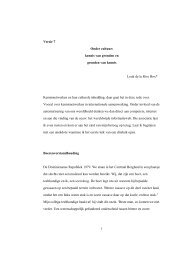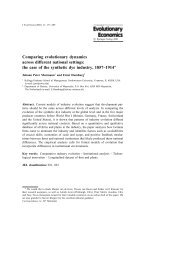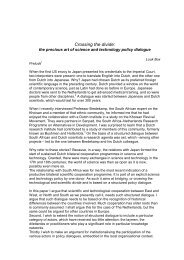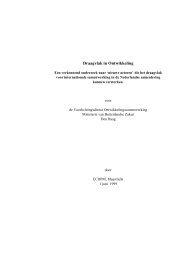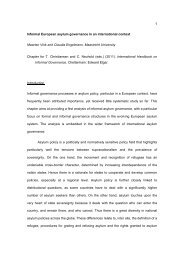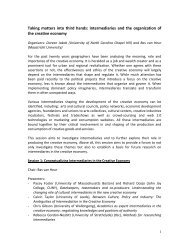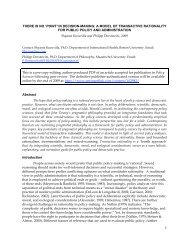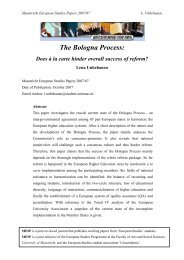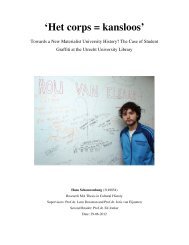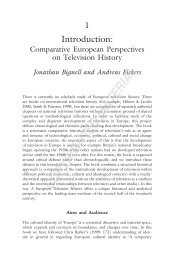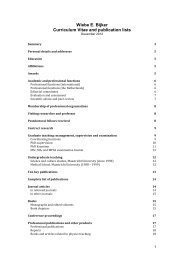Winds of Change: The Europeanization of National Foreign Policy
Winds of Change: The Europeanization of National Foreign Policy
Winds of Change: The Europeanization of National Foreign Policy
Create successful ePaper yourself
Turn your PDF publications into a flip-book with our unique Google optimized e-Paper software.
Maastricht European Studies Papers 2007/01 Bennet Strang<br />
<strong>Winds</strong> <strong>of</strong> <strong>Change</strong>: <strong>The</strong> <strong>Europeanization</strong> <strong>of</strong> <strong>National</strong><br />
<strong>Foreign</strong> <strong>Policy</strong><br />
Maastricht European Studies Papers 2007/01<br />
Date <strong>of</strong> Publication: January 2007<br />
Email Author: b.strang@student.unimaas.nl<br />
Abstract:<br />
Bennet Strang<br />
This paper applies the multi-faceted theory <strong>of</strong> <strong>Europeanization</strong> to the domain <strong>of</strong><br />
national foreign policy and traces the change the latter underwent in response to the<br />
impact <strong>of</strong> EU institutions, norms and policy-making styles. <strong>The</strong> analysis <strong>of</strong> both the<br />
characteristics <strong>of</strong> and interrelatedness between the notions <strong>of</strong> sovereignty and foreign<br />
policy will highlight their receptivity to change. As will become apparent, foreign<br />
policy is not an impermeable realm <strong>of</strong> state sovereignty. This insight provides the<br />
basis for an outline <strong>of</strong> the repercussions the European arena has on national foreign<br />
policy regimes and the conduct <strong>of</strong> foreign policy. Practical examples <strong>of</strong> this impact<br />
will draw on a definition <strong>of</strong> the <strong>Europeanization</strong> concept and an analysis <strong>of</strong> its<br />
characteristics.<br />
MESP is a peer-reviewed journal that publishes working papers from ‘European Studies’ students.<br />
MESP is a joint initiative <strong>of</strong> the European Studies Programme at the Faculty <strong>of</strong> Arts and Social<br />
Sciences, University <strong>of</strong> Maastricht, and the European Studies student association ‘Concordantia’.
Maastricht European Studies Papers 2007/01 Bennet Strang<br />
Contents<br />
1. Introduction p. 1<br />
2. At the Heart <strong>of</strong> <strong>Foreign</strong> <strong>Policy</strong> – Sovereignty p. 2<br />
3. At the Heart <strong>of</strong> Sovereignty – <strong>Foreign</strong> <strong>Policy</strong> p. 4<br />
4. <strong>Foreign</strong> <strong>Policy</strong> goes Europe, or the other Way around? – p. 7<br />
<strong>The</strong> <strong>Europeanization</strong> <strong>of</strong> <strong>Foreign</strong> <strong>Policy</strong><br />
4.1 Defining ‘<strong>Europeanization</strong> <strong>of</strong> <strong>Foreign</strong> <strong>Policy</strong>’ p. 8<br />
4.2 Delving further into a multi-faceted concept p. 10<br />
4.2.1 <strong>National</strong> Adaptation p. 11<br />
4.2.2 <strong>National</strong> Projection p. 13<br />
4.2.3 Elite Socialization p. 14<br />
4.2.4 Bureaucratic Re-organization p. 16<br />
4.3 Enabling and (Constraining) Conceptual Limits p. 17<br />
5. Conclusion p. 19<br />
6. References p. 21<br />
7. Appendix p. 24
Maastricht European Studies Papers 2007/01 Bennet Strang<br />
1. Introduction<br />
It was a surprise that he went to Teheran, wasn’t it? When the five permanent members <strong>of</strong> the<br />
United Nations’ (UN) Security Council plus Germany met in order to discuss the further<br />
strategy <strong>of</strong> how to deal with Iran’s attempts to get its hands on the nuclear weapon, the<br />
European Union’s High Representative for the Common <strong>Foreign</strong> and Security <strong>Policy</strong> (CFSP)<br />
was commissioned to deliver the group’s proposals to Teheran personally. <strong>The</strong> observer may<br />
have been struck by surprise that Mr Solana, embodying the EU’s ‘foreign policy’, conveyed<br />
the message and not one <strong>of</strong> the five (six) ministers <strong>of</strong> foreign affairs. As there has always been<br />
a lot <strong>of</strong> symbolism to the discipline <strong>of</strong> diplomacy, this journey can certainly be considered<br />
symbolic too.<br />
Since the times <strong>of</strong> the failed European Defence Community (EDC), European member<br />
states have increasingly come to devise common foreign policy positions. In this process, both<br />
globalization and European integration in ‘high politics’ have left their imprint on the<br />
traditional and modern, Westphalian, notions <strong>of</strong> both sovereignty and the (sovereign) state.<br />
However, in the post-modern context <strong>of</strong> the European integration project, these two concepts<br />
have undergone substantive change. This is likewise applicable to the concept and exercise <strong>of</strong><br />
national foreign policy, which is not any longer directed against other European states, aiming<br />
to assert a state’s sovereignty but increasingly incorporated in and part <strong>of</strong> common European<br />
positions to external challenges. This re-orientation is exemplified by the emergence <strong>of</strong><br />
concerted European foreign policy approaches, i.e. led by the EU-3 in the Iranian case, and<br />
the so-called phenomenon <strong>of</strong> <strong>Europeanization</strong>.<br />
<strong>The</strong> latter broadly speaking refers to both the impact <strong>of</strong> ‘the European’ on ‘the<br />
domestic’ and vice versa. Still being in its infancy, <strong>Europeanization</strong> has originally only been<br />
applied to first pillar developments but is increasingly used to account for occurrences which<br />
take place in the second one. In this context, it is an applicable explanatory tool to account for<br />
changes in the fields <strong>of</strong> both foreign policy and sovereignty, which will be also carried out in<br />
this paper. Being a fashionable term, it has a wide analytical scope, which in turn contains the<br />
risk <strong>of</strong> conceptual stretching.<br />
Firstly, the focus will be on the meanings and characteristics <strong>of</strong> two intimately<br />
interlinked concepts, i.e. foreign policy and sovereignty. <strong>The</strong> analysis will highlight that the<br />
<strong>Europeanization</strong> <strong>of</strong> foreign policy is a post-modern phenomenon occurring in a post-modern<br />
polity, which is made possible and builds upon the conceptual changes <strong>of</strong> both foreign policy<br />
and sovereignty. In an attempt to attach flesh to the characteristics and shortcomings <strong>of</strong> the<br />
multi-faceted <strong>Europeanization</strong> concept in the light <strong>of</strong> foreign policy, practical examples<br />
1
Maastricht European Studies Papers 2007/01 Bennet Strang<br />
there<strong>of</strong> will be provided. <strong>The</strong> reader, thus, gets an impression <strong>of</strong> the real-life repercussions<br />
<strong>Europeanization</strong> has on national foreign policy cultures, their ways <strong>of</strong> conduct and, finally,<br />
their transformation against the European backdrop.<br />
2. At the Heart <strong>of</strong> <strong>Foreign</strong> <strong>Policy</strong> – Sovereignty<br />
“One <strong>of</strong> the most important analytical challenges for scholars <strong>of</strong> international relations is to<br />
identify different meanings <strong>of</strong> state, sovereignty and territory, and to understand their origins,<br />
comprehend their changes <strong>of</strong> meaning, analyze their interrelationships, and characterize their<br />
transformations” 1<br />
In the undertaking <strong>of</strong> tracing the impact <strong>of</strong> <strong>Europeanization</strong> on foreign policy, the analytical<br />
emphasis must firstly be on the dynamic concept <strong>of</strong> sovereignty. Elaborating on its meaning,<br />
methodological linkages with foreign policy and the changes it underwent will provide the<br />
framework to position an analysis <strong>of</strong> the <strong>Europeanization</strong> <strong>of</strong> foreign policy. However, the very<br />
meaning <strong>of</strong> the concept <strong>of</strong> sovereignty has to be clarified first.<br />
Principally, the concept <strong>of</strong> sovereignty has been and still is a central and popular one<br />
in the international system, on top <strong>of</strong> which it is “…difficult to acquire – and to lose” (Hill,<br />
2003, p. 31). Connected to the notions <strong>of</strong> authority, identity and territory (Biersteker, 2002),<br />
“…sovereignty means that a state enjoys political independence from other states” (Jackson/<br />
Sørensen, 2003, p. 280). Being the promising guiding light <strong>of</strong> all nations seeking to brake<br />
away from colonial rule or dominant oppressors and aiming to establish a sovereign, i.e.<br />
independent, nation-state, the possession <strong>of</strong> sovereignty is synonymous with having had the<br />
power to acquire and maintain it (Hill, 2003). Likewise, the mentioning <strong>of</strong> sovereignty in a<br />
Westphalian sense took and continues to take place in one stroke <strong>of</strong> breath with reference to a<br />
state, just as you have to say B after you have said A (Biersteker, 2002).<br />
<strong>The</strong> ‘state’, however, is essentially a socially constructed concept (ibid). This gives<br />
rise to the question <strong>of</strong> how the concept <strong>of</strong> sovereignty will adapt to possible changes in the<br />
definition <strong>of</strong> a ‘state’, in the context <strong>of</strong> European integration and the intrusive forces <strong>of</strong><br />
globalization. Unquestioningly, “…the possibility <strong>of</strong> change in the operational meaning <strong>of</strong><br />
sovereignty…” (p. 162) exists, which is underlined by the continuously evolving connotations<br />
<strong>of</strong> the dynamic concepts <strong>of</strong> both sovereignty and state (ibid.; Jackson/ Sørensen, 2003). <strong>The</strong><br />
explanatory scope <strong>of</strong> traditional realist state-centric approaches, however, does not account<br />
for such transformations (ibid.; Biersteker, 2002). Nevertheless, the fact that the Westphalian<br />
concept <strong>of</strong> sovereignty has undergone considerable change and currently continues to do so<br />
1 (Biersteker, 2002, p. 157)<br />
2
Maastricht European Studies Papers 2007/01 Bennet Strang<br />
under the impact <strong>of</strong> the supranational European integration process implies that theories on<br />
sovereignty should expand their focus and analytical scope. This would allow them to account<br />
for those forces which are at the heart <strong>of</strong> the change in the meanings <strong>of</strong> both state and<br />
sovereignty (ibid.). <strong>The</strong> latter has, anyways, never existed in a realist, ‘pure’ form, the reason<br />
for which is why some scholars refer to it as “…‘organized hypocrisy’…” (Krasner quoted in<br />
Biersteker, 2002, p. 161). States necessarily intervene in each other’s affairs in the process <strong>of</strong><br />
mutual interaction, which in turn strictly speaking violates the key principle <strong>of</strong> sovereignty,<br />
i.e. the principle <strong>of</strong> non-intervention. Thus, it is interesting to see how the concept <strong>of</strong><br />
sovereignty changes in the process <strong>of</strong> continuous interaction brought about by European<br />
integration.<br />
This idea <strong>of</strong> change has also been alluded to by the former UN Secretary General<br />
Ghali, who remarked that the “…‘the time for absolute and exclusive sovereignty…has<br />
passed’…” (quoted in Jackson/ Sørensen, 2003, p. 281). 2 Accordingly, the traditional state-<br />
centric conduct <strong>of</strong> foreign policy, which has always aimed at maintaining full state<br />
sovereignty, has increasingly acquired a European dimension. However, despite Kissinger’s 3<br />
warning not to abandon the sovereign nation-state as long as there is no proven alternative in<br />
place yet, the EU member states ceded substantial parts <strong>of</strong> their sovereignty and thereby<br />
increasingly transformed this concept into a “…bargaining resource for a politics<br />
characterized by complex transnational networks’” (Keohane quoted in ibid. p. 283). In this<br />
process <strong>of</strong> European integration, foreign policy, at whose heart sovereignty is, has been<br />
subjected to the impact <strong>of</strong> EU institutions, norms and policy-making styles. As a result,<br />
foreign policy itself underwent considerable change.<br />
“<strong>The</strong>re is a lively debate on the impact <strong>of</strong> <strong>Europeanization</strong>” (Radaelli, 2000, p. 10).<br />
Departing from the assumption that sovereignty is essentially connected to a claim <strong>of</strong><br />
authority 4 , the <strong>Europeanization</strong> challenge to foreign policy inherently represents such an<br />
issue-specific demand 5 (Biersteker, 2002). Considering that authority claims “…determine[]<br />
the change in the meaning <strong>of</strong> sovereignty…” (p. 168) and that states face other authority<br />
claims from (supranational) actors in the field <strong>of</strong> foreign policy, one has to ask further<br />
whether the <strong>Europeanization</strong> process gradually hollows out the sovereignty <strong>of</strong> EU member<br />
2<br />
Nevertheless, it is still the predominant principle <strong>of</strong> International Relations (IR) worldwide (Jackson/<br />
Sørensen, 2003).<br />
3<br />
Henry A. Kissinger was <strong>National</strong> Security Advisor (1969-1975) and US Secretary <strong>of</strong> State (1973-<br />
1977).<br />
4<br />
‘Authority’ refers in this context to the institutionalized power <strong>of</strong> national foreign ministries in their<br />
conduct <strong>of</strong> foreign policy (Biersteker, 2002).<br />
5<br />
<strong>The</strong> impact <strong>of</strong> <strong>Europeanization</strong> on foreign policy will be elaborated upon in the following parts <strong>of</strong> the<br />
paper.<br />
3
Maastricht European Studies Papers 2007/01 Bennet Strang<br />
states in foreign affairs. This might finally lead to the de-coupling <strong>of</strong> the concepts <strong>of</strong> state and<br />
sovereignty (ibid.). Likewise, as the traditional meaning <strong>of</strong> what a ‘state’ constitutes is<br />
increasingly being challenged in the process <strong>of</strong> European integration, so is the traditional<br />
notion <strong>of</strong> state-centric sovereignty.<br />
Nonetheless, an eventual change in the meaning <strong>of</strong> the latter does not necessarily<br />
amount to the generalizing equation ‘<strong>Europeanization</strong> <strong>of</strong> foreign policy=loss <strong>of</strong> sovereignty’<br />
(ibid.). What it gives rise to, however, is the valid question <strong>of</strong> whether one can continue to<br />
apply and stick to the modern Westphalian conception <strong>of</strong> sovereignty, considering the<br />
contemporary foreign policy making style, which is increasingly rooted in inter-state<br />
cooperation and embedded in a European framework (ibid.). Moreover, it has to be asked<br />
whether we are currently witnessing a shift to a post-Westphalian notion <strong>of</strong> sovereignty, <strong>of</strong><br />
which the increasingly Europeanized and post-modern conduct <strong>of</strong> foreign policy might be<br />
indicative. In order to prepare the basis for answering this question, light will be shed on the<br />
nature <strong>of</strong> the concept <strong>of</strong> foreign policy in the following section.<br />
3. At the Heart <strong>of</strong> Sovereignty – <strong>Foreign</strong> <strong>Policy</strong><br />
<strong>The</strong> purpose <strong>of</strong> a nation’s foreign policy should be power, strength and influence in<br />
furtherance <strong>of</strong> its interests and beliefs. That purpose never changes. But the context in which<br />
it is pursued does. 6<br />
Indeed, the context has changed, as outlined with regard to the supposed transformations <strong>of</strong><br />
the sovereignty concept. Before focusing on the changed environment in which foreign policy<br />
is contemporarily conducted, the very concept must be addressed first. <strong>The</strong> reader will notice<br />
that the concepts <strong>of</strong> sovereignty and foreign policy are both intimately intertwined and<br />
complementary. However, what is ‘foreign policy’?<br />
<strong>The</strong>re is no fast answer to this question, as there are multiple definitions, giving rise to<br />
a certain conceptual ambiguity (Carlsnaes, 2002). Choosing a definition, however, is<br />
“…crucial in circumscribing the field <strong>of</strong> investigation” (Manners/ Whitman, 2000, p. 2). On<br />
the one hand, it must be narrow enough in order to be workable, while it should also not be<br />
too narrow on the other hand (ibid.). In its simplest form, foreign policy refers to the external<br />
activities and relations <strong>of</strong> a sovereign state with other states in pursuance <strong>of</strong> its objectives in<br />
the international community (Manners/ Whitman, 2000; Mahncke, 2004; Bátora, 2005).<br />
Opting for a more sophisticated definition <strong>of</strong> the concept, one could say that<br />
6 (Blair quoted in Haugevik, 2005, p. 7)<br />
4
Maastricht European Studies Papers 2007/01 Bennet Strang<br />
“foreign policies consist <strong>of</strong> those actions which, expressed in the form <strong>of</strong> explicitly<br />
stated goals, commitments and/or directives, and pursued by governmental<br />
representatives acting on behalf <strong>of</strong> their sovereign communities, are directed toward<br />
objectives, conditions and actors- both governmental and non-governmental – which<br />
they want to affect and which lie beyond their territorial legitimacy [own emphasis]” 7<br />
<strong>The</strong> mentioning <strong>of</strong> ‘sovereign communities’ in one stroke <strong>of</strong> breath with foreign policy points<br />
to the intimate linkage between both concepts, over which one will come across more <strong>of</strong>ten in<br />
this paper. Additionally, reference to a community reveals another aspect <strong>of</strong> foreign policy,<br />
which is related to the notion <strong>of</strong> identity each <strong>of</strong> the former has (Aggestam, 1999). <strong>Foreign</strong><br />
policy, accordingly, “…plays a significant role in the socio-political imagination <strong>of</strong> a<br />
collective identity” (ibid.; Torreblanca, 2001). Put differently by applying Rousseau’s volonté<br />
générale concept, foreign policy can be seen as the expression <strong>of</strong> the sovereign people’s will.<br />
This reading even more emphasizes its status as the key sovereignty domain <strong>of</strong> nation-states<br />
(Hill, 2003). In the course <strong>of</strong> ‘expressing’ the popular will, policy-makers draw on the so-<br />
called politics <strong>of</strong> identity in order to “…mobilise a sense <strong>of</strong> cohesion and solidarity to<br />
legitimate the general thrust <strong>of</strong> foreign policy” (Aggestam, 1999). Following this line <strong>of</strong><br />
thought, the so-called concept <strong>of</strong> national responsibility, which holds that statesmen are<br />
exclusively responsible for the well-being <strong>of</strong> their people 8 , would be applicable here (Jackson/<br />
Sørensen, 2003).<br />
<strong>The</strong> definition, furthermore, contains a state-centred bias, which is typical for modern<br />
Westphalian conceptualizations <strong>of</strong> foreign policy. However, it is problematic if one wants to<br />
account for the increasingly consensual and cross-national style <strong>of</strong> contemporary post-modern<br />
foreign policy-making (Wong, 2005). According to this reasoning, the exercise <strong>of</strong> foreign<br />
policy is considered to be “…the domaine réservé <strong>of</strong> sovereign governments and therefore<br />
exclusive to states” (p. 140) 9 . This implies that foreign policy is an impermeable realm,<br />
7 (Carlsnaes, 2002, p. 335). Additionally, one could conceptualize foreign policy as being made up <strong>of</strong><br />
“…‘ideas or actions designed by policy makers to solve a problem or promote some change in the<br />
policies, attitudes, or actions <strong>of</strong> another state or states, in nonstate actors, in the international economy,<br />
or in the physical environment <strong>of</strong> the world’” (Wong, 2005, p. 140). <strong>The</strong> main instrument <strong>of</strong> foreign is<br />
diplomacy, which in turn can be characterized as “‘the process <strong>of</strong> dialogue and negotiation by which<br />
states in a system conduct their relations and pursue their purposes by means short <strong>of</strong> war’” (Watson<br />
quoted in Bátora, 2005, p. 46).<br />
8 In order to live up to this (realist) obligation, statesmen are expected to have nothing else in mind but<br />
national self-interest, the protection <strong>of</strong> national security and, finally, the defence and advancement <strong>of</strong><br />
their own people’s benefit, all <strong>of</strong> which they are morally obliged to (Jackson/ Sørensen, 2003).<br />
9 One has to be aware <strong>of</strong> the existence <strong>of</strong> so-called national ‘ring-fenced’ domains, which states do not<br />
want to see touched upon or affected by the characteristics <strong>of</strong> <strong>Europeanization</strong> (Manners/ Whitman,<br />
2000).<br />
5
Maastricht European Studies Papers 2007/01 Bennet Strang<br />
forbidden to supranational influences (Sjursen, 2003). <strong>The</strong> associated state-centric school 10 ,<br />
thus, favours the traditional realist and intergovernmental approach with states being<br />
sovereign key actors, putting a premium on self-interest and utility maximization (Wong,<br />
2005). <strong>The</strong> European idealist school 11 , in contrast, also allows for non-state actors to play a<br />
role in foreign policy. Nonetheless, it does not fail to acknowledge that states’ foreign policies<br />
are important though, allegedly, being gradually replaced by a common European approach<br />
(ibid.).<br />
<strong>The</strong> theoretical assumptions <strong>of</strong> the state-centric school appear to be outdated, against<br />
the background <strong>of</strong> the incrementally developing European venue <strong>of</strong> foreign policy making. As<br />
“…studying foreign policy in an EU context has its particular intricacies” (Mahncke, 2004, p.<br />
27), since multiple non-state actors are involved in a multilevel foreign policy game 12<br />
(Sjursen, 2003), one “…must at least reflect on the possibility that the very fundament <strong>of</strong><br />
national foreign policy is changing” (Sjursen, 1999; Biersteker, 2002). Understandably,<br />
European states have jealously tried to maintain full foreign policy autonomy (Smith, 2003),<br />
although they could not forestall that<br />
“‘…the conduct <strong>of</strong> foreign policy [has been moved] away from the old nation-state<br />
sovereignty model towards a collective endeavour, a form <strong>of</strong> high-level networking<br />
with transformationalist effects and even more potential’ [own emphasis]” 13 .<br />
<strong>The</strong> prospect <strong>of</strong> an increased foreign policy ‘potential’, i.e. greater impact, which derives from<br />
a concerted European position on foreign policy matters, is a key motivation to cooperate in<br />
this sensitive area in the first place 14 .<br />
10 In accordance with this school, traditional foreign policy analysis is applicable and maintains that<br />
the member states remain the key actors (Manners/ Whitman, 2000).<br />
11 To this school, transformational foreign policy analysis is attributable, which holds that the conduct<br />
<strong>of</strong> foreign policy gradually slips into the hands <strong>of</strong> supranational actors, who thereby increasingly play<br />
into this key sovereignty domain <strong>of</strong> the nation-state (Manners/ Whitman, 2000).<br />
12 In this context, “…EU membership involves asking some difficult questions <strong>of</strong> foreign policy<br />
practices…” (Manners/ Whitman, 2000, p. 264), as for example the one about the influence <strong>of</strong> the<br />
European Commission on foreign policy-making under first pillar prerogatives, cross-pillar conflicts<br />
and delimitations <strong>of</strong> influence in external matters and eventual rival claims to external representation<br />
in Brussels by the German Länder.<br />
13 (Hill quoted in Wong, 2005, p. 138)<br />
14 This also relates to the motivation <strong>of</strong> small member states to amplify their voice by siding with<br />
bigger ones. Moreover, there is <strong>of</strong> course a certain conflict <strong>of</strong> interest observable, characterized on the<br />
one hand by the “…drive to act collectively on the world stage and the desire to retain national<br />
autonomy…” (Smith, 2003, p. 230), on the other. It seems appropriate to suggest that “…the Member<br />
States conduct all but the most limited foreign policies objectives inside an EU context” (Manners/<br />
Whitman, 2000, p. 243). <strong>The</strong> “[t]he value <strong>of</strong> Political Cooperation to member governments has thus to<br />
be established and re-established as new issues and crises arise” (Wallace quoted in Hill, 1983, p. 8).<br />
6
Maastricht European Studies Papers 2007/01 Bennet Strang<br />
4. <strong>Foreign</strong> <strong>Policy</strong> goes Europe, or the other Way around? – <strong>The</strong><br />
<strong>Europeanization</strong> <strong>of</strong> <strong>Foreign</strong> <strong>Policy</strong><br />
By having highlighted the conceptual characteristics <strong>of</strong> both foreign policy and sovereignty, it<br />
has become apparent that both interlinked concepts have been subjected to and underwent<br />
substantial change. Furthermore, a basis has been provided from which one can further<br />
elaborate on the concept <strong>of</strong> <strong>Europeanization</strong>, how it is defined, its theoretical components, the<br />
advantages and disadvantages <strong>of</strong> its use and its limits. In the following section, the strands<br />
previously analyzed will, thus, be put together and both enriched and complemented with the<br />
introduction <strong>of</strong> this new concept. Moreover, the relationship between both <strong>Europeanization</strong><br />
and globalization will be dealt with. Finally, an outlook <strong>of</strong> the impact <strong>of</strong> the former will round<br />
<strong>of</strong>f the picture <strong>of</strong> theoretical elaborations substantiated with practical examples.<br />
However, before the repercussions <strong>of</strong> <strong>Europeanization</strong> on foreign policy can take<br />
center stage, on overview <strong>of</strong> the different connotations and usages <strong>of</strong> the concept has to be<br />
given first. Olsen (2003) enumerates five different dimensions in this respect. It is, thus<br />
firstly, used in reference to denote European enlargement, secondly, it is synonymous with the<br />
development <strong>of</strong> European governance institutions, thirdly, <strong>Europeanization</strong> is relied upon to<br />
characterize the worldwide export <strong>of</strong> “…European forms <strong>of</strong> political organization and<br />
governance…” (p. 334), fourthly, it can be seen as a political concept aiming at deepening<br />
European integration and, fifthly and finally, <strong>Europeanization</strong> can refer to the domestic<br />
impact <strong>of</strong> European institutions on EU member states. <strong>The</strong> term’s usage in these multiple<br />
contexts highlights that it lacks a stable definition, which, according to Olsen (2003), brings<br />
with it the question <strong>of</strong> whether the concept is useful at all.<br />
Moreover, a question which has to be asked at this point is whether foreign policy is<br />
immune to <strong>Europeanization</strong>, as member states supposedly guard this key domain <strong>of</strong> national<br />
sovereignty jealously (Wong, 2005). If this were the case, there would be no sense in studying<br />
the <strong>Europeanization</strong> <strong>of</strong> foreign policy 15 . However, i Fanés (2001) affirms that “…there is a<br />
case for studying the Europeanisation <strong>of</strong> foreign policy, despite the fact that this policy<br />
remains, by and large, at the national governments’ hands”, indeed. It, thus, becomes apparent<br />
that “…foreign policy is not a special case immune to <strong>Europeanization</strong> pressures… [emphasis<br />
in original]” (Wong, 2005, p. 137). As a consequence, the traditional modern state-centric<br />
image <strong>of</strong> regarding foreign policy (and sovereignty) as an impermeable and exclusive domain<br />
<strong>of</strong> nation-states proves to be outdated once more. This becomes even further apparent by<br />
15 So far, “…relatively little research has been conducted on the <strong>Europeanization</strong> <strong>of</strong> national foreign<br />
policy…” (Osswald, 2005, p. 4; Smith, 2003).<br />
7
Maastricht European Studies Papers 2007/01 Bennet Strang<br />
considering, firstly, “…competing centres <strong>of</strong> influence…” (Manners/ Whitman, 2000, p. 244)<br />
in the European post-modern setting, which, secondly, are at the heart <strong>of</strong> and contribute to the<br />
increasing blurring <strong>of</strong> the previously clear demarcation <strong>of</strong> what constitutes the ‘domestic’ and<br />
the ‘foreign’ sphere 16 even in high politics, i.e. foreign policy 17 (Sjursen, 1999; Manners/<br />
Whitman, 2000; Wong, 2005). Before elaborating upon the facets <strong>of</strong> the <strong>Europeanization</strong> <strong>of</strong><br />
foreign policy in-depth, an attempt to define this phenomenon has to be made first.<br />
4.1 Defining ‘<strong>Europeanization</strong> <strong>of</strong> <strong>Foreign</strong> <strong>Policy</strong>’<br />
“‘<strong>Europeanization</strong>’…can be a useful entry-point for greater understanding <strong>of</strong> important<br />
changes occurring in our politics and society. <strong>The</strong> obligation <strong>of</strong> the researcher is to give it a<br />
precise meaning” 18<br />
Attributing a ‘precise meaning’ to <strong>Europeanization</strong> <strong>of</strong> foreign policy is, indeed, not such an<br />
easy task as it appears to be at first sight, since there is no common definition (Smith, 2003).<br />
It is pivotal not to equate the perception <strong>of</strong> the <strong>Europeanization</strong> <strong>of</strong> ‘less sensitive’ policy areas<br />
with the degree and characteristics <strong>of</strong> the same phenomenon in the field (and special case) <strong>of</strong><br />
foreign policy. Thus, member states will not readily agree to a transfer <strong>of</strong> competences and,<br />
thereby, sovereignty to Brussels in this prestigious domain (Sjursen, 2003), as they probably<br />
would and have more easily done in low politics areas 19 , such as environmental policy.<br />
Nonetheless, the features <strong>Europeanization</strong> processes <strong>of</strong> both low and high politics have in<br />
common are incrementalism, the concern about domestic adaptation to EU decision-making,<br />
norms and atmosphere 20 and “…the political and policy changes caused by the impact <strong>of</strong><br />
16 This is to say that due to the <strong>Europeanization</strong> process, European policy is nowadays increasingly<br />
perceived <strong>of</strong> as being part <strong>of</strong> domestic policy, leading to a situation in which it “…is no longer<br />
possible to make a clear distinction between European foreign and domestic policy…” (Manners/<br />
Whitman, 2000, p. 44).<br />
17 However, the <strong>Europeanization</strong> <strong>of</strong> foreign policy can at this point in the paper already be said to<br />
represent a special case, as it is “…not just another public policy” (Torreblanca, 2001) area in which<br />
<strong>Europeanization</strong> takes place. This view will further manifest itself in the course <strong>of</strong> the paper.<br />
18 (Featherstone, 2003, p. 3)<br />
19 Even in the field <strong>of</strong> the Common <strong>Foreign</strong> and Security <strong>Policy</strong> (CFSP), which can be seen both as an<br />
expression <strong>of</strong> concerted action in the sensitive foreign policy domain and “…a process <strong>of</strong><br />
‘Europeanisation’ <strong>of</strong> foreign policy…” (Sjursen, 2003, p. 15), member states still vigorously affirm<br />
their central decision-making prerogatives by having subjected CFSP decision-making to<br />
intergovernmental unanimity. Thus, the perception <strong>of</strong> <strong>Europeanization</strong> <strong>of</strong> foreign policy as being a<br />
vertical and hierarchical top-down process embedded in a principal-agent structure (de Flers, 2005) is<br />
considered by member states to be absolutely beyond the pale. This, in turn, does not neglect the<br />
CFSP’s transformative impact on their foreign policies, which is limited as far as the socialization <strong>of</strong><br />
policy makers in a European sense is concerned, inter alia inhibiting “…the EU to act decisively”<br />
(Manners/ Whitman, 2000, p. 80; Sjursen, 2003; de Flers, 2005)<br />
20 One <strong>of</strong> the earliest definitions <strong>of</strong> <strong>Europeanization</strong> has been put forward by Ladrech, accounting for it<br />
as “…‘a process reorienting the direction and shape <strong>of</strong> politics to the degree that EU political and<br />
8
Maastricht European Studies Papers 2007/01 Bennet Strang<br />
membership in the European Union on the member states” (Wong, 2005, p. 135; Manners/<br />
Whitman, 2000) 21 . This mix <strong>of</strong> adaptation, elite socialization and re-organization <strong>of</strong> foreign<br />
policy (structures) is, after reviewing alternative suggestions 22 , best captured by Tonra’s<br />
definition. Accordingly, <strong>Europeanization</strong> <strong>of</strong> foreign policy is characterized by<br />
“‘…a transformation in the way in which national foreign policies are constructed<br />
[following pressure for adaptation], in the ways in which pr<strong>of</strong>essional roles are defined<br />
and pursued and in the consequent internationalisation <strong>of</strong> norms and expectations arising<br />
from a complex system <strong>of</strong> collective European policy making’” 23 .<br />
Taking this conceptualization as the paper’s underlying working definition and after having<br />
defined the concept, extensive light will subsequently be shed on the facets <strong>of</strong><br />
<strong>Europeanization</strong> <strong>of</strong> foreign policy in general.<br />
4.2 Delving further into a multi-faceted 24 concept<br />
“…Europeanisation provides a fascinating perspective on how governance is changing” 25 .<br />
‘<strong>Change</strong>’ seems to be a good starting point for this section, as the very fact that<br />
<strong>Europeanization</strong> is being applied to foreign policy is already indicative <strong>of</strong> a certain change.<br />
economic dynamics become part <strong>of</strong> the organizational logic <strong>of</strong> national politics and policy-making’”<br />
(quoted in Featherstone, 2003, p. 12). He has, thus, very much emphasized the element <strong>of</strong> receptive<br />
adaptation (i Fanés, 2001). However, the implicit precondition for ‘reorienting the direction and shape<br />
<strong>of</strong> politics’ is that those actors deciding on politics have been affected, the process <strong>of</strong> which is<br />
accounted for by Radaelli. He, consequently, defines <strong>Europeanization</strong> as “‘…processes <strong>of</strong> (a)<br />
construction (b) diffusion and (c) institutionalization <strong>of</strong> formal and informal rules, procedures, policy<br />
paradigms, styles, ‘ways <strong>of</strong> doing things’, and shared beliefs and norms which are first defined and<br />
consolidated in the EU policy process and then incorporated in the logic <strong>of</strong> domestic (national and<br />
subnational) discourse, political structures, and public policies’” (quoted in Featherstone, 2003, p. 17).<br />
21 <strong>The</strong> underlying assumption <strong>of</strong> debating the impact <strong>of</strong> ‘the EU’ on domestic structures <strong>of</strong> all sorts is<br />
<strong>of</strong> course that ‘the EU factor’ matters. This recognition is already an implicit acknowledgment <strong>of</strong> the<br />
EU’s importance. Furthermore, the very fact that the connection between both <strong>Europeanization</strong> and<br />
foreign policy domain is being made, hints at the increased importance <strong>of</strong> the European venue for the<br />
making <strong>of</strong> national foreign policy. Accordingly, “[t]he key proposition <strong>of</strong> <strong>Europeanization</strong> is that<br />
membership in the European Union has an important impact on each member state’s foreign policy<br />
and that this impact is increasing in salience” (Wong, 2005, p. 152). This impact, however, is<br />
inherently “…incremental, irregular, and uneven over time and between locations…” (Featherstone,<br />
2003, p. 4).<br />
22 i Fanés (2001) emphasizes the ‘adaptation dimension’ <strong>of</strong> <strong>Europeanization</strong> <strong>of</strong> foreign policy, defining<br />
it “…as the process <strong>of</strong> foreign policy change at the national level originated by the adaptation<br />
pressures and the new opportunities generated by the European integration process” (White, 2001;<br />
Featherstone, 2003).<br />
23 (quoted in Manners/ Whitman, 2000, p. 245)<br />
24 This multi-faceted nature becomes clear from being able to think <strong>of</strong> ‘<strong>Europeanization</strong>’ broadly as<br />
(a) enlargement, (b) institutionalization at the European level, (c) export <strong>of</strong> European institutions, (d)<br />
European integration project and its strengthening and, (f) domestic impact <strong>of</strong> EU institutions’ output<br />
(Smith, 2003).<br />
25 (Radaelli, 2004, p. 16)<br />
9
Maastricht European Studies Papers 2007/01 Bennet Strang<br />
Originally being only confined to supranational first pillar developments, nobody would have<br />
imagined applying this ‘first pillar concept’ to the second, intergovernmental, pillar (Major/<br />
Pomorska, 2005). Whereas one could also safely conceptualize the increasing<br />
communitarization <strong>of</strong> policy areas in the process <strong>of</strong> European integration by means <strong>of</strong> the<br />
ne<strong>of</strong>unctionalist spillover idea, such thinking seemed to be likewise inconceivable with<br />
regards to second pillar (‘spillover’) developments 26 .<br />
Nonetheless, Mahncke (2004) makes the case for applying the spillover concept to<br />
developments in the intergovernmental domain 27 . <strong>The</strong> exception, however, is that states are<br />
not passively subjected to a ‘drive’ towards increasing integration in foreign policy issues<br />
(ibid.). Thus, there is no automatism, which is in turn suggested by ne<strong>of</strong>unctionalism 28 .<br />
<strong>The</strong>re is, however, a wasteful use <strong>of</strong> this fashionable term <strong>Europeanization</strong> has become<br />
(Torreblanca, 2001), leading to a situation in which the concept in general is expected to<br />
“…explain processes <strong>of</strong> cultural change, new identities formation, policy change,<br />
administrative innovation, and even modernization” (Radaelli, 2000, p. 4). It has to be<br />
inquired whether such a demand does not result in conceptual stretching, arbitrariness and<br />
shallowness. Due to its intergovernmental character, the foreign policy domain in particular<br />
has only seen a rare usage <strong>of</strong> the concept 29 (Featherstone, 2003).<br />
Despite its initially less frequent usage, the very invocation <strong>of</strong> <strong>Europeanization</strong> in<br />
relation with foreign policy “…has reflected the evolution <strong>of</strong> EU foreign policy coordination<br />
itself” (Featherstone, 2003, p. 10). This evolution can be accounted for by the already outlined<br />
ne<strong>of</strong>unctionalist approach and both constructivist and realist theories, which will later be<br />
addressed (Osswald, 2005). <strong>The</strong>re is, in fact, a certain evolutionary process, a ‘Brusselisation’<br />
<strong>of</strong> foreign policy 30 going on. Even “…states jealous <strong>of</strong> their foreign policy sovereignty have<br />
not been immune to…” (Wong, 2005, p. 145) this development. Notwithstanding, it has to be<br />
26<br />
An example would be the development from European Political Cooperation (EPC) to the<br />
increasingly assertive European <strong>Foreign</strong> <strong>Policy</strong> (EFP).<br />
27<br />
One should, nevertheless, acknowledge and keep in mind the pitfalls associated with this<br />
application.<br />
28<br />
In matters <strong>of</strong> foreign policy cooperation, the member states have always chosen and “…choose<br />
which aspects <strong>of</strong> their foreign policy they share, and which they retain” (Manners/ Whitman, 2000, p.<br />
266), with the majority <strong>of</strong> foreign policy issues still being dealt with by them (Mahncke, 2004). As one<br />
might even observe a re-nationalization <strong>of</strong> foreign policy in crises (cf. Iraq War) (Mackenstein/ Marsh,<br />
2005), it becomes even more obvious that the “…EU is far from a single entity that dictates the actions<br />
<strong>of</strong> its member states” (p. 248).<br />
29<br />
As another consequence, “…cases related to EU foreign policy have not figured high in the research<br />
agenda <strong>of</strong> <strong>Europeanization</strong>” (Torreblanca, 2001; Osswald, 2005).<br />
30<br />
<strong>The</strong> impact <strong>of</strong> this ‘Brusselisation’ has uncovered that some Member States’ “…notions <strong>of</strong><br />
specialness and…domain[es] privé[s] are more fluid concepts than was initially thought…” (Manners/<br />
Whitman, 2000, p. 268). This very fact points at the indirect strength <strong>of</strong> <strong>Europeanization</strong> in foreign<br />
policy affairs.<br />
10
Maastricht European Studies Papers 2007/01 Bennet Strang<br />
stressed again that there is no uncontrollable automatism in place 31 , i.e. “…‘Brusselisation’ <strong>of</strong><br />
foreign policy does not mean the wholesale communitarization <strong>of</strong> foreign policy making and<br />
implementation…” (Manners/ Whitman, 2000, p. 264).<br />
In the following, the analysis will turn towards and separately elaborate upon four<br />
central theoretical components <strong>of</strong> <strong>Europeanization</strong> <strong>of</strong> foreign policy. <strong>The</strong>se are national<br />
adaptation (downloading), national projection (uploading), elite socialization and bureaucratic<br />
re-organization. In addition, horizontal learning and adaptation processes amongst the<br />
member states are taking place, the phenomenon <strong>of</strong> which is termed ‘crossloading’ 32 . <strong>The</strong>se<br />
components can, nonetheless, not as neatly be separated from each other as this clear-cut<br />
enumeration suggests. It needs to be stressed that particularly the very vaguely defined term<br />
‘national adaptation’ might serve as a heading under which one could group both elite<br />
socialization and bureaucratic re-organization as sub-points. <strong>The</strong> corresponding reason is that<br />
changes in these intertwined areas also inherently contain a certain adaptation. This<br />
subsumption is made possible by the implicit broadness <strong>of</strong> the term ‘national adaptation’.<br />
Nevertheless, the paper will elaborate on each <strong>of</strong> those points separately for the following<br />
analysis, in order to pay tribute to their distinctiveness and individual importance.<br />
4.2.1 <strong>National</strong> Adaptation<br />
“…‘[T]he ability <strong>of</strong> a political actor to change its behaviour so as to meet challenges in the<br />
form <strong>of</strong> new demands by altering the means <strong>of</strong> action’…” 33<br />
Being this ‘political actor’, the focus is on states when talking about national adaptation 34 ,<br />
which can be broadly characterized as those steps a state undertakes in adjustment to<br />
European influences. As the traces <strong>of</strong> national adaptation, i.e. down-loading, are very difficult<br />
to detect, the question is with which means and to what extent one could ‘measure’ it. Smith<br />
(2000) proposes, inter alia, both elite socialization and bureaucratic re-organization as<br />
indicators, on which the focus will be in this context (Smith, 2000; Featherstone, 2003). In<br />
these two, the feature <strong>of</strong> modernization is implied, which hints at the reform <strong>of</strong> national<br />
foreign policy standpoints in response to EU membership, i.e. to <strong>Europeanization</strong>.<br />
31 On the contrary, it is interesting to observe that states have used CFSP failures as a justification and<br />
pretext to ‘strike back’ by ‘renationalizing’ their foreign policy a bit more.<br />
32 See Appendix, Annex 2. See also footnote 39.<br />
33 (Manners/ Whitman, 2000, p. 245)<br />
34 See Appendix, Annex 1.<br />
11
Maastricht European Studies Papers 2007/01 Bennet Strang<br />
Thus, Ireland, Austria, Finland and Sweden can be taken as examples <strong>of</strong> states which all have<br />
adapted their foreign policy regimes in response and adaptation 35 to joining the EU 36 (Wong,<br />
2005). Accordingly, they moved from neutrality to post-neutrality. EU membership has, in a<br />
similar vein, Europeanized Spain’s foreign policy 37 . As a result, it acquired a distinctive EU<br />
pr<strong>of</strong>ile (Torreblanca, 2001). Thinking further about the incremental top-down adaptation<br />
process in which states are reactive and muddle themselves through, one should not expect<br />
identical outcomes from adaptation. <strong>The</strong> reason is that the states’ different domestic<br />
‘seedbeds’ condition dissimilar national repercussions (Wong, 2005). This is the same in the<br />
foreign policy domain, where “…the pre-existing orientation <strong>of</strong> external relations which<br />
Member States...” (Manners/ Whitman, 2000, p. 262) have needs to be taken into<br />
consideration 38 .<br />
Those ‘orientations’ sometimes find their expression in a national foreign policy<br />
domaine privé, which no member state would accept to be affected by eventually conflictual<br />
EU positions (Hill, 1983). One can, thus, safely say that “…adaptation is more a function <strong>of</strong><br />
attitude than time…” (Manners/ Whitman, 2000, p. 248). Subsequently, the two forms <strong>of</strong><br />
adaptation, i.e. both rationalist adaptation with preferences remaining stable and constructivist<br />
adaptation, where policy learning 39 results in a change <strong>of</strong> preferences, will be dealt with.<br />
Turning, as above-mentioned, to both constructivist and realist approaches, the<br />
rationalist perspective holds that adaptation takes place according to the logic <strong>of</strong><br />
consequentiality. This means that egoistic actors take the self-interested and strategic decision<br />
to carry out adaptation only when it is in the state’s rational interest (de Flers, 2005).<br />
Nonetheless, this approach is not all-explanatory, as it only covers half <strong>of</strong> the picture.<br />
<strong>The</strong>refore, it needs to be complemented by a social constructivist perspective, focusing on<br />
35 <strong>National</strong> adaptation refers in this context to the change in content <strong>of</strong> the countries’ foreign policies.<br />
36 Obviously, “EU adaptation appears to play an important role in the ‘modernisation’ <strong>of</strong> Member<br />
States’ [twenty-first century] foreign policies…” (Manners/ Whitman, 2000, p. 246).<br />
37 After the country had emerged from Franco’s dictatorship, it needed to consolidate the young<br />
democracy and regain international esteem. For this purpose, an extensive foreign policy<br />
transformation set in, which was triggered by EU membership and in the course <strong>of</strong> which Spain<br />
abandoned its neutrality by achieving NATO membership (Torreblanca, 2001).<br />
38 Hence, “[i]f domestic modifications occur, their extent and their inherent mechanisms will depend<br />
not only upon the European input, but also upon the particular conditions <strong>of</strong> the national level on<br />
which they act…national opportunity structures…” (Major/ Pomorska, 2005).<br />
39 <strong>Policy</strong> learning can be defined as “‘…actors chang[ing] not only how they deal with particular<br />
problems but also their very concept <strong>of</strong> problem solving – resulting form the recognition that they and<br />
other actors face similar conditions, have mutual interests, and share aspirations’” (Ruggie quoted in<br />
Sjursen, 2003 p. 17). Having learned from the devastating disunity in the course <strong>of</strong> the Iraq crisis, the<br />
Member States devised the European Security Strategy (ESS), which is an example and outcome <strong>of</strong><br />
policy learning (Mahncke, 2004; Lebl, 2004).<br />
12
Maastricht European Studies Papers 2007/01 Bennet Strang<br />
rules, norms, identity, ideas and communicative action 40 (Sjursen, 1999; i Fanés, 2001).<br />
Those, undoubtedly, also play a role besides purely rational explanations. According to the<br />
constructivist logic <strong>of</strong> appropriateness 41 , actors adhere to social rules prevailing in<br />
institutional settings. Hence, <strong>Europeanization</strong> might change their preferences as they undergo<br />
learning and socialization processes. Those result from social interactions in the process <strong>of</strong><br />
dealing with foreign affairs at a European level 42 (de Flers, 2005).<br />
4.2.2 <strong>National</strong> Projection<br />
“…[P]rojecting a particular set <strong>of</strong> [domestic] concerns...[into the international arena]” 43<br />
<strong>National</strong> projection 44 might be seen as complementing and mirroring adaptation. Whereas the<br />
latter is a top-down process impacting upon reactive states, the former represents a bottom-up<br />
procedure, with which states actively upload their national policy preferences onto the<br />
European level. <strong>The</strong>y, thereby, reduce both the risk and costs associated with misfit and<br />
subsequent adaptation and increase their international influence (Wong, 2005). Both the<br />
Netherlands and Austria, for example, have managed to upload their positions on human<br />
rights (Manners/ Whitman, 2000), just as Spain has succeeded in selling its foreign policy<br />
prerogatives 45 to the EU. Those were, accordingly, Europeanized and the EU was driven to<br />
adopt a foreign policy stance to Spain’s liking in the latter’s areas <strong>of</strong> interest.<br />
In this uploading process, the EU is turned into and used as an extremely forceful<br />
amplifier <strong>of</strong> national interests 46 (Torreblanca, 2001). Although it might at first sight be<br />
40 This concept has been developed by the German philosopher Jürgen Habermas.<br />
41 Linked to this logic is a phenomenon called normative isomorphism, or socialization logic, which<br />
relates to a situation in which individuals with similar pr<strong>of</strong>essional and educational backgrounds work<br />
together (e.g. in the Political and Security Committee (PSC)) and, thereby, start to perceive <strong>of</strong> things<br />
eventually in the same vein. <strong>The</strong> process conditioning this outcome is commonly referred to as crossloading,<br />
which is exactly defined as “the exchange <strong>of</strong> ideas, norms and ‘ways <strong>of</strong> doing’ things between<br />
countries or other entities for which the EU sets the scene” (Major/ Pomorska, 2005). In this regard,<br />
“…Europeanisation in foreign and security policy operates through a voluntary horizontal [learning]<br />
process…[in an EU forum]” (ibid.).<br />
42 Social constructivism, hence, emphasizes the force <strong>of</strong> ideas and their role in shaping policy actors’<br />
behaviour, the deep impact <strong>of</strong> normative structures on both identity and interest formation, the<br />
possibility <strong>of</strong> s<strong>of</strong>t power, identity production and the value <strong>of</strong> knowledge as an influential key factor<br />
(Katzenstein, 1997; Manners/ Whitman, 2000).<br />
43 (Hill, 2003, p. 31)<br />
44 See Appendix, Annex 1.<br />
45 Those include “…Latin America or the Mediterranean, in which the EU had minor or marginal<br />
interests…” (Torreblanca, 2001).<br />
46 Another example would be the Baltic States, which have sought and acquired the ‘European backup’<br />
in their conflictual relationships with Russia through EU membership and, thereby, subsequently lent<br />
additional weight to their positions (Mahncke, 2004).<br />
13
Maastricht European Studies Papers 2007/01 Bennet Strang<br />
supposed that projection is more successfully exercised by larger states due to their<br />
comparatively extensive administrative capabilities, the validity <strong>of</strong> this suggestion can be<br />
doubted. Both domestic pressures and the level <strong>of</strong> commitment to EU policy development is<br />
more decisive (Wong, 2005). What can be said, however, is that the more complex and large<br />
Europe becomes the harder it gets for (rivalling) states to project their national foreign policy<br />
objectives (Maull, 2006).<br />
4.2.3 Elite Socialization<br />
“European socialisation not necessarily concerns the adoption <strong>of</strong> supranational role<br />
conceptions at the expense <strong>of</strong> intergovernmental conceptions or the mere shift <strong>of</strong> one category<br />
to another; it might also imply a re-definition or a re-conceptualisation <strong>of</strong> existing<br />
intergovernmental conceptions” 47 .<br />
While tracing national adaptation has already proven to be a difficult undertaking, even more<br />
so is uncovering evidence for this ‘re-conceptualization’, i.e. the repercussions <strong>of</strong> elite<br />
socialization (Manners/ Whitman, 2000). It is easier to enumerate the conditions for it to<br />
happen in the first place. Those are secrecy, a communication reflex, consensus and mutual<br />
respect for and acceptance <strong>of</strong> domaines privés (Osswald, 2005). Proposing this definition<br />
according to which<br />
“[s]ocialization…means the process by which actors internalize the norms which then<br />
influence how they see themselves and what they perceive as their [potentially<br />
changing national] interests” 48 ,<br />
the pivotal importance and centrality for the <strong>Europeanization</strong> <strong>of</strong> foreign policy becomes<br />
apparent. Assuming that the socialization <strong>of</strong> policy-makers into a European decision-making<br />
framework has an effect on their belief system 49 , the distinctive national orientation they have<br />
might be supplemented if not partly transformed by commonly accepted and legitimate 50<br />
European norms and social identities. Those transnational norms are subsequently adhered to,<br />
inter alia, in national day-to-day policy-making. This <strong>Europeanization</strong> <strong>of</strong> decision-makers 51<br />
47 (Beyers, 2002)<br />
48 (i Fanés, 2001)<br />
49 “<strong>The</strong> `belief system' <strong>of</strong> the practitioner is a deep-rooted legacy <strong>of</strong> experience and political culture,<br />
but it is also an organic set <strong>of</strong> attitudes which is capable, within limits, <strong>of</strong> self-transformation” (Hill<br />
quoted in Aggestam, 1999).<br />
50 Likewise, the increasing practice to take decisions in the EU arena is also considered to be<br />
legitimate, according to the so-called appropriateness logic (Smith, 2004).<br />
51 Some scholars suggest that larger member states experience a lower degree <strong>of</strong> elite socialization in<br />
the foreign policy domain, in contrast to smaller ones (Manners/ Whitman, 2000). However, despite<br />
the fact that “[e]ven for actors who are regularly involved in European policy-making, European<br />
experiences basically function as a secondary socialisation processes… [emphasis on original]”<br />
14
Maastricht European Studies Papers 2007/01 Bennet Strang<br />
is, in turn, expected to result in more decisions having a European dimension (Sjursen, 2003).<br />
Elite socialization at the European level is, furthermore, made possible and enhanced by<br />
mutual trust and a club atmosphere, to whose informal norms and rules the participants adhere<br />
(Smith, 2000; Osswald, 2005). An increasing European orientation <strong>of</strong> foreign policy-making<br />
groups might, thus, “…lead to an actual ‘Europeanisation’ <strong>of</strong> foreign policy…” (Manners/<br />
Whitman, 2000, p. 8) 52 . In this context, it can be imagined that the envisioned establishment<br />
<strong>of</strong> a European diplomatic service, the European External Action Service (EEAS) 53 , might<br />
eventually represent a socializing institution 54 and lead to an increased convergence in<br />
European foreign policy positions 55 (Mahncke, 2004).<br />
Case studies have highlighted that regular consultation, confidentiality and a<br />
consensual decision-making style, which are the characteristics <strong>of</strong> the European foreign<br />
policy-making 56 community, have already decisively impacted upon national foreign policy<br />
structures and belief systems and, thereby, led to a certain convergence in outcomes 57<br />
(Beyers, 2002), the question arises, firstly, <strong>of</strong> how to ‘measure’ socialization degrees in comparative<br />
terms and, secondly, <strong>of</strong> why smaller states allegedly experience a higher degree. One suggestion might<br />
be that as smaller states do not have as many alternative diplomatic venues as larger ones do, they<br />
concentrate all their efforts on the European venue to make their impact felt by engaging in national<br />
projection. Due to this intense exposition to and contact with European decision-making channels,<br />
they, consequently, become more Europeanized.<br />
52 Nevertheless, one should not overestimate the transformative impact <strong>of</strong> elite socialization <strong>of</strong> foreign<br />
policy-makers at the European level. Corresponding to Aggestam’s (1999) suggestion that e.g.<br />
“German foreign policy-makers…tend to avoid acknowledging potential role-conflicts in case that<br />
would involve privileging a particular institution or set <strong>of</strong> relationships in favour <strong>of</strong> another”, an<br />
interview with an high-ranking <strong>of</strong>ficial <strong>of</strong> the Permanent Representation <strong>of</strong> the Federal Republic <strong>of</strong><br />
Germany neglected any loyalty or identity conflicts between both the national and European level.<br />
Thus, one ‘chooses not to choose’, in accordance with the German sowohl als auch approach.<br />
Nonetheless, the necessity to think transnationally, which comes with holding the EU presidency, and<br />
the frequent lending <strong>of</strong> national diplomats, formalized in the 1981 London Report, advance the<br />
European socialization <strong>of</strong> foreign policy actors (Osswald, 2005).<br />
53 However, with the negative referenda on the constitutional treaty in France and the Netherlands, this<br />
service has not come into existence for the time being.<br />
54 Smith (2003) defines socializing institutions as “…develop[ing], through education and<br />
socialization, a territorial identity and a cultural community with a sense <strong>of</strong> belonging, emotional<br />
attachment, and shared codes <strong>of</strong> meaning” (p. 338).<br />
55 One could argue that the EFP has to be build up from the micro level onwards by means <strong>of</strong><br />
educating (socializing) diplomats in a European spirit. Common thinking and mutual understanding<br />
will, thus, result eventually in common European positions. In this context, Duke (2002) proposes the<br />
establishment <strong>of</strong> an educational institution in order to provide prospective diplomats with a<br />
distinctively European background. Since the member states will, however, not that easily give in on<br />
the possibility to send their nationally minded diplomats to Brussels, “…any diplomatic training at the<br />
European level must be careful not to present itself as an alternative to national diplomatic training<br />
schemes” (p. 865; Mahncke, 2004).<br />
56 This community provides “…a textured environment, a part in a process, a social sphere for<br />
continued and intensifying interaction” (Manners/ Whitman, 2000, p. 251).<br />
57 Convergence, yes or no; this question is disputed. Much depends on the terming <strong>of</strong> whether one can<br />
speak about convergence to have taken place. Osswald (2005) already considers the weakening <strong>of</strong> the<br />
Austrian and Irish neutrality status to be indicative <strong>of</strong> convergence. However, “…Europeanisation is<br />
15
Maastricht European Studies Papers 2007/01 Bennet Strang<br />
(Torreblanca, 2001; Featherstone, 2003; Smith, 2004; Mahncke, 2004). <strong>The</strong> COREU telex<br />
system 58 , firstly, embodies this réflexe communautaire (Wong, 2005) and, secondly, serves as<br />
an enabling feature for coordination to take place. One might suggest that the very existence<br />
<strong>of</strong> this réflexe is indicative <strong>of</strong> a feedback process, characterized by “…national<br />
politicians…increasingly think[ing] in European terms…” (Mahncke, 2004, p. 372).<br />
4.2.4 Bureaucratic Re-organization<br />
This ‘thinking in European terms’ is also reflected in the extensive re-organization <strong>of</strong> national<br />
foreign service structures in response to improving participation in CFSP over the years 59<br />
(Sjursen, 2003). New national CFSP counsellors have been appointed, diplomatic services<br />
extended and departmental re-orientation towards Europe has taken place. In this process,<br />
smaller member states have been more willingly adjusted their comparatively limited<br />
administrative structures (Smith, 2000). It might be suggested that as the European venue is<br />
pivotal for smaller states in contrast to larger ones, which have more alternative diplomatic<br />
channels, the former ones have to concentrate all their efforts on the European venue to make<br />
their impact felt. Furthermore, whereas the UK, for instance, might consider the use <strong>of</strong><br />
European channels to be a loss compared to its lost world power status, smaller states more<br />
likely regard this venue to be a gain for the conduct <strong>of</strong> their foreign policy and status upgrade.<br />
4.3 Enabling and (Constraining) Conceptual Limits<br />
After having elaborated on the theoretical components <strong>of</strong> the concept, the focus will shift to<br />
the debate as to whether <strong>Europeanization</strong> enables and/ or constrains national governments in<br />
their conduct <strong>of</strong> foreign policy. This will be followed by an outline <strong>of</strong> the concept’s limits.<br />
Turning to the enabling theory first, functional logic holds that the European venue can be<br />
not convergence” (Radaelli, 2004, p. 14; Radaelli, 2000). <strong>The</strong> member states are still in the driver’s<br />
seat when it comes to deciding on whether they converge on positions and act collectively or not<br />
(Smith, 2003). For the time being, the ‘cooperators’ prevail over the ‘integrators’, as “[c]oordination<br />
rather than integration…remains the guideline” (Mahncke, 2004, p. 32; Hill, 1983; Smith, 2003).<br />
58 This system, which enables European national foreign ministries to exchange information in a very<br />
short time and, eventually, coordinate action, is “…assumed to have a socializing character and to<br />
support the convergence among national foreign policy actors” (Osswald, 2005, p. 21). Accordingly,<br />
“Spanish participation in the EPC framework…proved decisive to socialize Spanish diplomats in the<br />
habits <strong>of</strong> coordination and consensus-seeking and to have Spanish policies gradually converge with<br />
those <strong>of</strong> the other member states” (Torreblanca, 2001).<br />
59 Thus, “there is substantial evidence to show that EU membership in general and CFSP membership<br />
in particular influence the way individual member states organize their pursuit <strong>of</strong> foreign policy”<br />
(Smith, 2000, p. 619; Smith, 2004).<br />
16
Maastricht European Studies Papers 2007/01 Bennet Strang<br />
used in order to amplify national interests 60 , provided that their uploading took place. From a<br />
realist and rationalist intergovernmental/ consequentiality perspective, <strong>Europeanization</strong> is<br />
only likely to occur after a cost-benefit analysis has revealed that participation in European<br />
structures would be in one’s own national self-interest. Based on the “…‘politics <strong>of</strong> scale’…”<br />
(Smith, 2003, p. 242) reasoning, deliberate recourse to EU instruments will only be made if<br />
their application better meets the challenges at hand than the use <strong>of</strong> national devices would (i<br />
Fanés, 2001).<br />
Those considerations allude once more to the question <strong>of</strong> whether the member states<br />
are controlling the <strong>Europeanization</strong> process, i.e. are in the driver’s seat, or whether the process<br />
controls them (Manners/ Whitman, 2000). Apart from that, the question <strong>of</strong> who serves whom<br />
is difficult to answer; it has been shown that no automatism exists. What is indisputable,<br />
however, is that foreign policy cooperation contains the possibility for member states to<br />
supervise and influence each other’s positions 61 (Mahncke, 2004). Furthermore, European<br />
participation enabled Spain, inter alia, to regain its international status after the Franco<br />
dictatorship, acquire more political influence and modernize its foreign service 62 . <strong>The</strong>re exist,<br />
however, “…‘tiers <strong>of</strong> exclusivity’…” (Manners/ Whitman, 2000, p. 10). <strong>The</strong>y refer to the<br />
extent to which a member state is able to influence EU external affairs relatively to other<br />
states. Accordingly, Germany would have more influence than Malta. Speaking with one<br />
voice, on the other hand, bestows enormous influence on all member states 63 (Wong, 2005).<br />
In the course <strong>of</strong> coming to a common position, concessions have to be made and compromises<br />
struck, which might be perceived <strong>of</strong> as being constraining.<br />
Even more constraining for the concept itself are its own limits. Identifying them is<br />
vital “…in order to be able to distinguish those changes which are a result <strong>of</strong> Europeanisation<br />
60 Accordingly, the “…EU has provided an excellent opportunity to enhance the foreign policy<br />
capacity and the national goals <strong>of</strong> a country which had a large and problematic foreign policy agenda,<br />
scant economic resources to match ambitions with policies, little international prestige, and a weak<br />
foreign service” (Torreblanca, 2001).<br />
61 On top <strong>of</strong> that, foreign policy-making in a European environment indirectly provides for the<br />
possibility <strong>of</strong> a so-called smokescreen, i.e. empowers states by “…by giving them manoeuvring room<br />
to make politically difficult domestic reforms under the cover <strong>of</strong> the EU” (Wong, 2005, p. 135). This<br />
may justify (in)action, provide an alibi for foreign policy change and deflect external pressure (Hill,<br />
1983).<br />
62 Likewise, Tonra notes with reference to Ireland, Denmark and Holland that “‘political co-operation<br />
improved the effectiveness, broadened the range and increased the capabilities <strong>of</strong> foreign policy<br />
making’” (quoted in Sjursen, 1999).<br />
63 Here, the impact <strong>of</strong> globalization on the conduct <strong>of</strong> foreign policy has to be elaborated upon. As<br />
globalization entails both growing levels <strong>of</strong> interconnectedness and interdependence, diplomacy must,<br />
thus, be more characterized by adjustment processes (White, 2005). Globalization, furthermore,<br />
“…creates pressures on the EU to act collectively” (Smith, 2003, p. 242) by challenging traditional<br />
state-centric notions <strong>of</strong> sovereignty and foreign policy (White, 2005). It, thereby, indirectly adds to the<br />
development <strong>of</strong> an EFP.<br />
17
Maastricht European Studies Papers 2007/01 Bennet Strang<br />
and those which are not” 64 (i Fanés, 2001). <strong>Europeanization</strong> must further not be thought <strong>of</strong> as<br />
and expected to be an all-explanatory concept. Other influences besides it have also to be<br />
accounted for (Major/ Pomorska, 2005). Particularly in foreign policy, the EU impact is very<br />
difficult to discern (ibid.), as national diplomats are not keen to admit to have been influenced<br />
by anything else than the national side. Another difficulty lies in the task to find indicators <strong>of</strong><br />
change in foreign policy in the first place (Osswald, 2005). Thus, “…the study <strong>of</strong> the<br />
Europeanisation <strong>of</strong> a policy is probably the most difficult because <strong>of</strong> the complexity <strong>of</strong><br />
isolating an ‘EU-effect’ [emphasis in original]” 65 (i Fanés, 2001).<br />
In the quest <strong>of</strong> identifying this ‘smoking gun’, the “…‘missing link’…” (Goetz quoted<br />
in Featherstone, 2003, p. 13) between both the effect and the supposed (European) cause, the<br />
attempt is made to uncover the existence <strong>of</strong> a causal chain connecting both (i Fanés, 2001).<br />
On top <strong>of</strong> that, the question <strong>of</strong> whether <strong>Europeanization</strong> is the cause (independent variable) or<br />
effect (dependent variable) has to be posed 66 . This would lead to a chicken and egg debate,<br />
though (ibid.).<br />
Besides this problem, a second challenge is to identify the “…relevance <strong>of</strong> change…”<br />
(i Fanés, 2001), i.e. the ‘deepness’ <strong>of</strong> adaptation and the transformation(s) it triggered. This is<br />
also easier said than done, as the act <strong>of</strong> attributing relevance is inherently a subjective<br />
undertaking, which can effortlessly be challenged. Adding to the collection <strong>of</strong> challenges is<br />
the third one to account for and separate endogenous and exogenous phenomena, which act in<br />
parallel to <strong>Europeanization</strong>, from the latter. Perceiving <strong>of</strong> <strong>Europeanization</strong> as an all-explaining<br />
causal factor is, thereby, to be forestalled (ibid.). Henceforth,<br />
“[t]he foreign policies <strong>of</strong> EU Member States are subject to a number <strong>of</strong> pressures and<br />
incentives for change which act at the same time as Europeanisation, sometimes in<br />
similar directions, sometimes in completely opposite…We should avoid attributing<br />
any detected policy change to a vague idea <strong>of</strong> ‘Europeanisation” (ibid.; Major/<br />
Pomorska, 2005).<br />
64 <strong>The</strong>re is, thus, the need for “…conceptual clarity…” (Smith, 2003, p. 333), in order to avoid the<br />
stretching <strong>of</strong> the <strong>Europeanization</strong> concept (Radaelli, 2000; Wong, 2005). This very fashionable<br />
concept must eventually be clearly defined so as to prevent it from being arbitrarily used for the<br />
description <strong>of</strong> anything.<br />
65 In foreign policy, no “…legal obligation or compliance-mechanism…” (Osswald, 2005, p. 2) exists,<br />
which adds to this problem. Thus, in order to discern the European impact on national foreign policy<br />
one has to ask what makes foreign policy distinctive compared to other policies (i Fanés, 2001).<br />
Provided this factor has been isolated, Wong (2005) proposes criteria with which the degree <strong>of</strong> a<br />
state’s foreign policy <strong>Europeanization</strong> could allegedly be measured. However, the extents <strong>of</strong><br />
adaptation, projection and elite socialization are, firstly, very hard to detect and, secondly, even harder<br />
to ‘measure’.<br />
66 Notwithstanding, “[t]he boundaries between cause and effect, independent and dependent variables<br />
are blurred…” (Bulmer/ Radaelli, 2004, p. 3).<br />
18
Maastricht European Studies Papers 2007/01 Bennet Strang<br />
Amongst those factors are things going on, firstly, in the domestic and, secondly, the<br />
international sphere. Referring to the first one, there might be national policy-making styles,<br />
administrative reforms, political transition processes and changes triggered by particularities<br />
<strong>of</strong> the party landscape, all <strong>of</strong> which have not been a result <strong>of</strong> <strong>Europeanization</strong> whatsoever (i<br />
Fanés, 2001). Concerning the second domain, global politics, changes caused by the end <strong>of</strong><br />
the Cold War, the impact <strong>of</strong> non-EU institutions in the international system on the member<br />
states’ foreign policies and globalization effects 67 can be at the heart <strong>of</strong> policy changes (ibid.).<br />
5. Conclusion<br />
In general, change is the rule, not the exception. This is also very much valid for the evolving<br />
conceptual meanings <strong>of</strong> both sovereignty and foreign policy, which have been triggered by<br />
the post-modern European integration and globalization processes. Initially, the focus has<br />
been on the connotations <strong>of</strong> these two dynamic and intertwined concepts and the changes<br />
thereto. As the notion <strong>of</strong> sovereignty has become increasingly blurred, the traditional conduct<br />
<strong>of</strong> state-centric foreign policy, which has always striven to primarily preserve the state’s<br />
sovereignty, has increasingly acquired a European dimension. This, in turn, manifests itself<br />
nowadays in EU common positions and the EU-3 initiative. In this context, the suggestion <strong>of</strong><br />
whether there is a shift from modern Westphalian to post-modern European notions <strong>of</strong> both<br />
sovereignty and foreign policy going on, upon which the <strong>Europeanization</strong> <strong>of</strong> foreign policy<br />
builds, has been put forward.<br />
Turning to the concept itself, the paper has shown that foreign policy, being the key<br />
sovereignty domain <strong>of</strong> nation-states, is not immune to the multi-faceted and imprecise concept<br />
<strong>of</strong> <strong>Europeanization</strong>. It has become apparent, though, that its application in the high politics<br />
field <strong>of</strong> foreign policy represents a special case, against the background <strong>of</strong> the other multiple<br />
usages <strong>of</strong> the term. However, the very fact that scholars talk about the <strong>Europeanization</strong> <strong>of</strong><br />
foreign policy is already indicative <strong>of</strong> a certain intrusion ‘<strong>of</strong> Europe’ into this domain. Against<br />
the impact <strong>of</strong> both increasing European integration and global pressures for the EU to act<br />
67 Pirro and Zeff (2005) come up with the interesting question <strong>of</strong> how <strong>Europeanization</strong> and<br />
globalization fit together. Additionally, one has to draw the definitional boundaries between them, so<br />
as to be able to distinguish between them. <strong>The</strong>y, thus, ask further: “…is <strong>Europeanization</strong> simply a<br />
regional variety <strong>of</strong> globalization?” (p. 211). On top <strong>of</strong> that, one has to think about whether<br />
<strong>Europeanization</strong> is part <strong>of</strong>, reaction to or bulwark against globalization (Bulmer/ Radaelli, 2004). Once<br />
more, the chicken and egg problem emerges, since “[t]o Wallace, the interaction <strong>of</strong> globalization and<br />
<strong>Europeanization</strong> is so close, it is hard to determine which is the leader and which the follower” (Pirro/<br />
Zeff, 2005, p. 214).<br />
19
Maastricht European Studies Papers 2007/01 Bennet Strang<br />
collectively, which would imply greater <strong>Europeanization</strong> <strong>of</strong> foreign policies, the following<br />
questions and suggestions will be proposed for further consideration.<br />
Firstly, is “…‘the determination to preserve national foreign policies…ultimately at<br />
odds with the ambition to create a European foreign policy [?]’…” (Allen quoted in White,<br />
2001, p. 37). Secondly, as all member states have to concert in the same European orchestra,<br />
who will be setting the tone, who will be deciding on the allocation <strong>of</strong> the roles to play and<br />
who will be the (indirect) maestro (Mahncke, 2004)? 68 It is, thirdly, suggested that increasing<br />
elite socialization and the eventual establishment <strong>of</strong> the EEAS will result both in long-term<br />
convergence in European foreign thinking and a more integrated and comprehensive EFP.<br />
This might currently be observed at the example <strong>of</strong> the EU’s role in the Iranian affair.<br />
Speaking with one voice, Europe has obviously learned from its mistakes in the run-up to the<br />
recent Iraq War. In this regard, it is not surprising anymore that Mr Solana went to Teheran,<br />
as initially suggested. Moreover, if Europeans get increasingly used to seeing EU<br />
representatives play a visible role in world affairs, this might be a first step in ‘socializing’<br />
them in a European sense.<br />
68 <strong>The</strong> cacophony <strong>of</strong> uncoordinated national voices during the Iraq crisis has exemplarily highlighted<br />
how weak Europe is, if it does not speak with one voice.<br />
20
Maastricht European Studies Papers 2007/01 Bennet Strang<br />
References<br />
Aggestam, L. (1999). Role Conceptions and the Politics <strong>of</strong> Identity in <strong>Foreign</strong> <strong>Policy</strong>. ARENA<br />
Working Papers WP 99/8. Retrieved June 12, 2006, from the World Wide<br />
Web: http://www.arena.uio.no/publications/wp99_8.htm<br />
Bátora, J. (2005). Does the European Union transform the institution <strong>of</strong> diplomacy? Journal<br />
<strong>of</strong> European Public <strong>Policy</strong>, 12:1, 44-66.<br />
Beyers, J. (2002). Multiple Embeddedness and Socialization in Europe: <strong>The</strong> Case <strong>of</strong> Council<br />
Officials. ARENA Working Papers WP 33/02. Retrieved June 17, 2006, from<br />
the World Wide Web: http://www.arena.uio.no/publications/workingpapers2002/papers/02_33.xml<br />
Biersteker, T.J. (2002). State, Sovereignty and Territory. In W. Carlsnaes, T. Risse, & B.A.<br />
Simmons (Eds.), Handbook <strong>of</strong> International Relations (pp. 157-177). London<br />
[etc.]: SAGE Publications.<br />
Bulmer, S.J., & Radaelli, C.M. (2004). <strong>The</strong> Europeanisation <strong>of</strong> <strong>National</strong> <strong>Policy</strong>? Queen’s<br />
Papers on Europeanisation No 1/2004. Retrieved June 12, 2006, from the<br />
World Wide Web:<br />
http://www.qub.ac.uk/schools/School<strong>of</strong>PoliticsInternationalStudiesandPhilosop<br />
hy/FileStore/EuropeanisationFiles/Filetoupload,5182,en.pdf<br />
Carlsnaes, W. (2002). <strong>Foreign</strong> <strong>Policy</strong>. In W. Carlsnaes, T. Risse, & B.A.<br />
Simmons (Eds.), Handbook <strong>of</strong> International Relations (pp. 331-350). London<br />
[etc.]: SAGE Publications.<br />
de Flers, N.A. (2005). <strong>The</strong>orising the effects <strong>of</strong> CFSP on national foreign policy and the<br />
concept <strong>of</strong> Europeanisation. CFSP Forum, Vol. 3, No. 5. Retrieved June 14,<br />
2006, from the World Wide Web:<br />
http://www.fornet.info/documents/CFSP%20Forum%20vol%203%20no%205.<br />
pdf<br />
Duke, S.W. (2002). Preparing for European Diplomacy? Journal <strong>of</strong> Common Market Studies,<br />
40, 849-70.<br />
Featherstone, K. (2003). Introduction: In the Name <strong>of</strong> ‘Europe’. In K. Featherstone & C. M.<br />
Radaelli (Eds.), <strong>The</strong> Politics <strong>of</strong> <strong>Europeanization</strong> (pp. 4-19). Oxford [etc.]:<br />
Oxford University Press.<br />
Haugevik, K.M. (2005). Strategic Adaptation or Identity <strong>Change</strong>? An analysis <strong>of</strong> Britain’s<br />
Approach to the ESDP 1998-2004. Oslo: Norwegian Institute <strong>of</strong> International<br />
Affairs. Retrieved June 12, 2006, from the World Wide Web:<br />
http://www.ciaonet.org/wps/nup010/nup010.pdf<br />
Hill, C. (1983). <strong>National</strong> <strong>Foreign</strong> Policies and European Political Cooperation. London:<br />
Royal Institute <strong>of</strong> International Affairs.<br />
21
Maastricht European Studies Papers 2007/01 Bennet Strang<br />
Hill, C. (2003). <strong>The</strong> Changing Politics <strong>of</strong> <strong>Foreign</strong> <strong>Policy</strong>. Basingstoke [etc.]: Palgrave<br />
Macmillan.<br />
i Fanés, J.V. (2001). Europeanisation and <strong>Foreign</strong> <strong>Policy</strong>. Barcelona: Institut Universitari<br />
d’Estudis Europeus. Retrieved June 12, 2006, from the World Wide Web:<br />
http://selene.uab.es/_cs_iuee/english/Obs/m_working.html<br />
Jackson, R.H., & Sørensen, G. (2003). Introduction to International Relations: <strong>The</strong>ories and<br />
Approaches. Oxford [etc.]: Oxford University Press.<br />
Katzenstein, P.J. (1997). United Germany in an Integrating Europe. Retrieved June 12, 2006,<br />
from the World Wide Web: http://www.ciaonet.org/wps/kap01/index.html<br />
Lebl, L.S. (2004). European Union Defense <strong>Policy</strong>: An American Perspective. <strong>Policy</strong><br />
Analysis, 516, 1-15.<br />
Mackenstein, H., & Marsh, S. (2005). <strong>The</strong> International Relations <strong>of</strong> the European Union.<br />
Harlow [etc.]: Pearson Longman.<br />
Mahncke, D. (2004).<strong>The</strong> Need for a Common <strong>Foreign</strong> <strong>Policy</strong>. In A. Ambos, D. Mahncke &<br />
C. Reynolds (Eds.), European <strong>Foreign</strong> <strong>Policy</strong>: From Rhetoric to Reality? (pp.<br />
27-43) Brussels: Lang.<br />
Major, C., & Pomorska, K. (2005). Europeanisation: Framework or Fashion? CFSP Forum,<br />
Vol. 3, No. 5. Retrieved June 14, 2006, from the World Wide Web:<br />
http://www.fornet.info/documents/CFSP%20Forum%20vol%203%20no%205.<br />
pdf<br />
Manners, I., & Whitman, R.G. (Eds.). (2000). <strong>The</strong> <strong>Foreign</strong> Policies <strong>of</strong> European Union<br />
Member States. Manchester [etc.]: Manchester University Press.<br />
Maull, H.W. (2006). Die prekäre Kontinuität: Deutsche Außenpolitik zwischen<br />
Pfadabhängigkeit und Anpassungsdruck. In M.G. Schmidt & R. Zohlnhöfer<br />
(Eds.), Regieren in der Bundesrepublik Deutschland, Innen –und Außenpolitik<br />
seit 1949 (pp. 1-28). Wiesbaden: Verlag für Sozialwissenschaften 2006.<br />
Olsen, J.P. (2003). <strong>Europeanization</strong>. In M. Cini (Ed.), European Union Politics (pp.<br />
333-347). Oxford [etc.]: Oxford University Press.<br />
Osswald, M. (2005). <strong>The</strong> <strong>Europeanization</strong> <strong>of</strong> <strong>National</strong> <strong>Foreign</strong> <strong>Policy</strong>: <strong>The</strong> Domestic Impact<br />
<strong>of</strong> European Union Membership on the (Post)-Neutral Countries Ireland and<br />
Austria. Konstanz: Fachbereich für Politik- und Verwaltungswissenschaft<br />
Universität Konstanz. Retrieved June 14, 2006, from the World Wide Web:<br />
http://www.ub.unikonstanz.de/v13/volltexte/2005/1646//pdf/<strong>Europeanization</strong>_<strong>of</strong>_<strong>National</strong>_Forei<br />
gn_<strong>Policy</strong>_MOsswald.pdf<br />
Pirro, E.B., & Zeff, E.E. (2005). <strong>Europeanization</strong>, European Integration, and Globalization.<br />
Retrieved June 19, 2006, from the World Wide Web:<br />
http://www.ciaonet.org/olj/shjdir/v6n1/shjdir_v6n1k.pdf<br />
22
Maastricht European Studies Papers 2007/01 Bennet Strang<br />
Radaelli, C.M. (2000). Wither <strong>Europeanization</strong>? Concept stretching and substantive change.<br />
European Integration online Papers, Vol. 4, No. 8. Retrieved June 12, 2006,<br />
from the World Wide Web: http://eiop.or.at/eiop/texte/2000-008a.htm<br />
Radaelli, C.M. (2004). Europeanisation: Solution or problem? European Integration online<br />
Papers, Vol. 8, No. 16. Retrieved June 12, 2006, from the World Wide Web:<br />
http://eiop.or.at/eiop/texte/2004-016a.htm<br />
Sjursen, H. (1999). <strong>The</strong> Common <strong>Foreign</strong> and Security <strong>Policy</strong>: an Emerging New Voice in<br />
International Politics? ARENA Working Papers WP 99/34. Retrieved June 14,<br />
2006, from the World Wide Web:<br />
http://www.arena.uio.no/publications/wp99_34.htm<br />
Sjursen, H. (2003). Understanding the Common <strong>Foreign</strong> and Security <strong>Policy</strong>: Analytical<br />
Building Blocs. ARENA Working Papers WP 09/03. Retrieved June 14, 2006,<br />
from the World Wide Web: http://www.arena.uio.no/publications/workingpapers2003/papers/03_09.xml<br />
Smith, M.E. (2000). Conforming to Europe: the domestic impact <strong>of</strong> EU foreign policy co-<br />
operation. Journal <strong>of</strong> European Public <strong>Policy</strong>, 7:4, 613-31.<br />
Smith, K. (2003). EU external relations. In M. Cini (Ed.), European Union Politics (pp.<br />
229-246). Oxford [etc.]: Oxford University Press.<br />
Smith, M.E. (2004). Toward a theory <strong>of</strong> EU foreign policy-making: multi-level governance,<br />
domestic politics, and national adaptation to Europe’s common foreign and<br />
security policy. Journal <strong>of</strong> European Public <strong>Policy</strong>, 11:4, 740-758.<br />
Torreblanca, J.I. (2001). Ideas, preferences and institutions: Explaining the <strong>Europeanization</strong><br />
<strong>of</strong> Spanish <strong>Foreign</strong> <strong>Policy</strong>. ARENA Working Papers WP 01/26. Retrieved June<br />
14, 2006, from the World Wide Web:<br />
http://www.arena.uio.no/publications/workingpapers2001/papers/wp01_26.htm<br />
White, B. (2001). Understanding European <strong>Foreign</strong> <strong>Policy</strong>. Basingstoke [etc.]: Palgrave<br />
Macmillan.<br />
White, B. (2005). Diplomacy. In J. Baylis & S. Smith (Eds.), <strong>The</strong> Globalization <strong>of</strong> World<br />
Politics: An Introduction to International Relations (pp. 387-405). Oxford<br />
[etc.]: Oxford University Press.<br />
Wong, R. (2005). <strong>The</strong> <strong>Europeanization</strong> <strong>of</strong> <strong>Foreign</strong> <strong>Policy</strong>. In C. Hill & M. Smith (Eds.),<br />
International Relations and the European Union (pp. 134-154). Oxford [etc.]:<br />
Oxford University Press.<br />
23
Maastricht European Studies Papers 2007/01 Bennet Strang<br />
Appendix<br />
Annex 1<br />
Source: de Flers, N.A. (2005). <strong>The</strong>orising the effects <strong>of</strong> CFSP on national foreign policy and<br />
the concept <strong>of</strong> Europeanisation. CFSP Forum, Vol. 3, No. 5. Retrieved June 14, 2006,<br />
from the World Wide Web:<br />
http://www.fornet.info/documents/CFSP%20Forum%20vol%203%20no%205.pdf<br />
Annex 2<br />
Source: de Flers, N.A. (2005). <strong>The</strong>orising the effects <strong>of</strong> CFSP on national foreign policy and<br />
the concept <strong>of</strong> Europeanisation. CFSP Forum, Vol. 3, No. 5. Retrieved June 14, 2006,<br />
from the World Wide Web:<br />
http://www.fornet.info/documents/CFSP%20Forum%20vol%203%20no%205.pdf<br />
24



